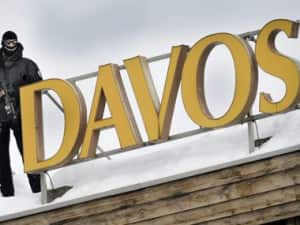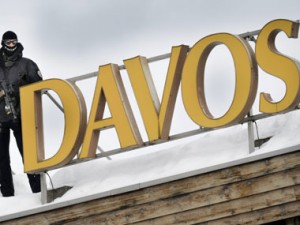The World Economic Forum - the annual extravaganza of big corporates and rich investors at Davos - has kicked off.
Reports say this year the forum is efforting an image change. Towards this end, trade unionists, anti-poverty campaigners and dissident economists are also getting to enjoy the snowy Alps, which otherwise used to be the prerogative of the rich.
The image makeover is aimed at containing the criticism that the WEF was an utter failure during and after the global financial crisis. Critics see the crisis as a failure of the capitalist system and organisations like the WEF, which supports and promotes all capitalist ideas from free markets to globalisation.
How much ever the WEF tries to change itself, the fact remains that it is a big platform of networking for the who’s who of global business.
Precisely why, India is present at the meet with a large delegation.
[caption id=“attachment_599197” align=“alignleft” width=“300”] It is undoubted that the government is spending a huge amount of money in its effort to grab attention of big investors.AP[/caption]
It is undoubted that the government is spending a huge amount of money in its effort to grab attention of big investors.AP[/caption]
According to a PTI report, Urban Development and Parliamentary Affairs Minister Kamal Nath is leading the Indian delegation, which includes Commerce and Industry Minister Anand Sharma, Heavy Industries and Public Enterprises Minister Praful Patel and Power Minister Jyotiraditya Scindia.
Those who have been invited for the meet also include Planning Commission Deputy Chairman Montek Singh Ahluwalia, Reliance Industries Chairman Mukesh Ambani, ICICI Bank CEO Chanda Kochhar and NRI steel tycoon Lakshmi Mittal. (Bad luck for BJP chief Nitin Gadkari, who also had got an invite.)
Indian corporate leaders who attend the meeting include Anand Mahindra, Azim Premji, Sunil Mittal, Rahul Bajaj, Adi Godrej, Sunil Munjal and also top executives of IT majors like TCS, Infosys and Mahindra Satyam.
It is undoubted that the government is spending a huge amount of money in its effort to grab attention of big investors.
But does this pay off?
According to a report in The Economic Times, there are indications India is not being able to catch the eyeballs at Davos 2013.
According to the report, of the 260 sessions at the meeting only one is focussed on India, where Kamal Nath will speak. Also, there are less than 20 speakers from India at the event.
Indeed this shows there is little or no significance for India and its economy at the summit.
Not a surprise, considering the poor state in which the country’s political-economy was over last one-and-half years.
For most of the period, the government fought scandals and its own regulators, remained inactive and rolled back most of the policy decisions. And finally when it became active, it was in a hurry to do many things in too little time.
Boosting sentiment has been the sole objective of much of the reforms that the government rolled out, including the approval given to Ikea’s investment proposal just one day ahead of the Davos summit.
It is a pity that investors are cold shouldering the much touted India story, at a time when the government is desperately looking to draw investment.
There is definitely a way out of the situation. But for this the government has to realise that there is no point in stooping too low to get foreign capital.
Also, history teaches us that there are dangers of kickbacks lurking in such campaigns.
A shift in focus to domestic capital from foreign capital is a much warranted one in the present situation. The government should, in right earnest, take steps to attract domestic capital.
Once domestic investment climate improves, foreign capital will also flow in.
After all, in today’s world what is the significance of WEF, which has been termed a “failures’ club" here ?
The forum is alive because networking is alive, not because of economy.
)